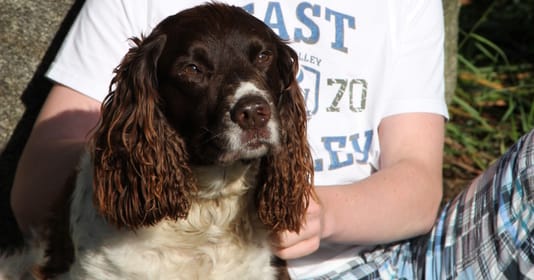Understanding english springer spaniel behavior problems is crucial for any potential or current owner. These energetic and intelligent dogs, while beloved for their affectionate and playful nature, can present unique challenges related to their behavior. Their inherent traits, such as a strong prey drive and boundless energy, can, if not managed correctly, lead to difficulties like destructive chewing, excessive barking, or even aggression.
This comprehensive guide delves into the intricacies of english springer spaniel behavior problems, exploring the root causes, exploring potential solutions, and highlighting the importance of a proactive and understanding approach to training and care. It’s our hope that, by navigating through this information, you’ll be better prepared to handle any behavioral issues with your English Springer Spaniel and build a strong and loving bond with your furry companion.

Overview of English Springer Spaniel Temperament
English Springer Spaniels are renowned for their vibrant and affectionate personalities, making them popular family companions. Understanding their inherent temperament is the first step towards successfully navigating any potential behavioral challenges. These characteristics, while often endearing, also serve as the foundation for some of the behavioral quirks that owners may encounter along their journey with these spirited dogs.
English springer spaniel behavior problems – Characteristics of the Breed
The breed’s origins are steeped in the world of hunting, where their exceptional athleticism and keen instincts were essential.
- Energetic and Athletic: English Springer Spaniels are naturally energetic and require a significant amount of daily exercise. Their high energy levels stem from their historical role as hunting dogs, where they were relied upon for extensive periods of activity. This innate energy needs a healthy outlet, and owners must be prepared to provide plenty of opportunities for physical exertion like long walks, playtime, and interactive games. Failure to meet their needs can result in pent-up energy manifesting as undesirable behaviors such as excessive barking or destructive chewing.
- Intelligent and Eager to Please: These dogs are intelligent and relatively easy to train, especially when positive reinforcement methods are employed. Their eagerness to please and strong desire for rewards can be harnessed to teach them a wide variety of commands and behaviors. However, their intelligence can also make them prone to boredom if not mentally stimulated appropriately. This can translate into problem behaviors like digging, chewing, or creating their own games that may not align with your home’s decor.
- Affectionate and Loyal: Springer Spaniels are known for their affectionate and loyal nature. They crave companionship and often form strong bonds with their families. This desire for human interaction is a source of much joy and affection, but it can also lead to separation anxiety if left alone for extended periods. This inherent need for companionship highlights the importance of establishing a comfortable and predictable routine, as abrupt changes or prolonged absences can greatly impact their emotional well-being.
- Sociable with Humans and Other Dogs: Typically, Springer Spaniels are sociable with humans and other dogs, particularly if they are properly socialized from a young age. Their inherent friendliness can be a wonderful quality enriching their social lives. However, their social interaction skills are deeply influenced by the level of socialization they receive during puppyhood. A lack of early exposure to various people, animals, and environments can result in a dog that is fearful or reactive towards unfamiliar stimuli, potentially hindering their ability to interact successfully in different social situations.

Importance of Energy Levels
Their boundless energy is a hallmark of the breed.
- Impact on Behavior: Understanding the energy levels of an English Springer Spaniel is fundamental to managing their behavior. Their energetic nature, if not managed effectively, can frequently lead to behavioral issues. Bored dogs are often destructive dogs. When their need for physical and mental exercise isn’t met, their pent-up energy can erupt in undesirable forms. A dog left idle for long periods may become destructive by chewing on furniture, digging in gardens, or barking incessantly.
- Creating a Balanced Routine: A balanced daily routine that encompasses both physical and mental stimulation helps to channel their incredible energy into positive activities. Finding the optimal balance for an individual dog can take time and observation, but it’s essential. Ensuring their exercise needs are met, coupled with activities that engage their minds, helps to prevent frustration and boredom, reducing the likelihood of behavioral problems arising due to understimulation. Engaging in activities like fetch, agility, or hide-and-seek helps to tire them out both physically and mentally. A key insight here is the importance of not just physical exercise but also mental stimulation. Dogs, like people, can become restless and unhappy if they aren’t sufficiently challenged intellectually.
- Consequences of Insufficient Exercise: Failing to provide adequate exercise can have profound implications for their well-being and can negatively impact their behavioral health. An under-stimulated English Springer Spaniel can become overly excitable, jumpy, and prone to impulsive behaviors. Their energy levels can simply spill over into destructive outlets if they aren’t given proper channels to release it. A routine that allows for daily physical activity not only keeps them physically fit but also contributes to their mental calmness. Springer Spaniels who enjoy regular exercise are often more well-adjusted and capable of engaging in calmer behaviours.
Common Behavioral Issues in English Springer Spaniels
Although generally friendly and eager to please, English Springer Spaniels can develop certain behavior patterns that present challenges for owners. These are often manifestations of their natural instincts and energy levels, particularly when combined with improper socialization or lack of proper training. Let’s delve into some of the most common behavior problems encountered with this breed.

Destructive Chewing
Destructive chewing is a frequent problem for many dog breeds, and Springer Spaniels are no exception.
- Underlying Causes: It’s important to remember that chewing is a natural behavior for dogs, especially puppies and young dogs. It’s a way to explore their environment and satisfy their oral needs. However, in the context of English Springer Spaniels, this behavior can be exacerbated by a lack of appropriate mental and physical stimulation. If the dog is left alone for extended periods without sufficient outlets to burn off their energy, or if they are bored, then chewing can become a destructive outlet for their frustration, anxiety, or boredom. A lack of mental engagement also plays a role. An unsatisfied dog may turn to destructive behaviors to entertain themselves.
- Prevention and Management: Early training and socialization are crucial in addressing this issue. By providing engaging toys that cater to their natural chewing instincts (like durable chew toys) and providing mental puzzles, you can redirect their chewing tendencies away from your furniture and other unwanted items. The key here is to replace the undesirable behaviors with pleasurable alternatives that satisfy their natural exploration and chewing demands. An important point is to provide sufficient chew toys and ensure that they are varied and engaging enough to maintain interest. The moment they start chewing on something you don’t want them to, immediately redirect their attention to a more appropriate chew toy or interactive game.
- Redirecting Behavior: Consistent training and redirection can shift the behavior from one of destruction to one of constructive engagement. Having an assortment of chew toys and puzzle feeders available can divert their attention when they feel the urge to chew. If you notice chewing on furniture, gently redirect their attention towards the toy, and positively reinforce that behavior. It’s important to emphasize positive reinforcement here – never resort to punishment or scolding, as that can worsen the situation.
Excessive Barking
Excessive barking can be a common issue with many dog breeds, particularly those bred for hunting and alerting functions, like the English Springer Spaniel.
- Reasons for Excessive Barking: Springer Spaniels, with their keen hearing and ability to alert, can exhibit barking that seems excessive. It’s a form of communication, and the reasons can vary. Sometimes it’s simply a way to communicate their excitement, or it can be a way of expressing boredom, anxiety, or fear. They might also be barking to alert you to something they perceive as a threat or an interesting sound. Additionally, the dog might be exhibiting territorial barking or barking because they feel insecure or want attention. It’s essential to ascertain the root cause of the behavior in order to address it effectively.
- Training Strategies: Early training and socialization are critical for managing this behaviour effectively. Start by teaching your dog a command that means “quiet” or “hush.” When they are barking excessively, give them the command, and if they stop, reward them with a treat or praise. This positive reinforcement helps them associate the “quiet” command with the reward it brings, making them more likely to comply in the future. Gradually increase the threshold by teaching them to respond with quiet even when they are slightly stimulated.
- Managing Environmental Triggers: Environmental triggers also play a significant role in excessive barking. For example, if they are constantly barking at squirrels in the garden, try to block their view of the stimulus, or create a distraction or alternative behavior to replace their barking. In some cases, providing visual barriers can help manage their perceived threats. It’s crucial to teach them that barking is not always the best way to communicate and get what they want.
Separation Anxiety
English Springer Spaniels, especially due to their affectionate and loyal personalities, can develop separation anxiety when left alone for extended periods.

- Symptoms of Separation Anxiety: Separation anxiety can manifest in several ways. Excessive barking, destructive behaviors, and even elimination inside the house can reflect underlying anxiety when separated from their family. They may also show signs of restlessness, pacing, whining, or drooling when left alone. In severe cases, dogs with separation anxiety can develop self-harming behaviors like self-mutilation, attempting to escape their enclosures, or becoming increasingly agitated even when their preferred humans are nearby. Understanding the signs can prompt you to intervene before they escalate.
- Addressing Separation Anxiety: Gradual desensitization is an important step in managing separation anxiety. Start by leaving the dog for very short periods at a time and gradually increasing the duration as they begin to develop comfort with being alone. Create a safe space for your dog when they are alone, a place where they have access to comfortable bedding, water, and some familiar toys or blankets. This can help to reduce their stress and anxiety. In addition, making sure they are exhausted before you leave can also be a great coping mechanism for them to adjust to your absence.
- Creating a Routine: Establishing a predictable routine is incredibly helpful for a dog prone to separation anxiety. Dogs thrive on stability and consistency. If their routine is disrupted, they are more likely to experience stress and display anxiety behaviors. Ensure that their daily schedule, including feeding, playtime, and walks, is as regular as possible. This reduces their feelings of uncertainty and aids in their adaptation to being alone. Also, make sure you establish a calm demeanor before leaving so they associate your leaving with a predictable calm, rather than a change in your tone or demeanor.
Factors Contributing to Behavior Problems
Several factors contribute to the development of behavior problems in English Springer Spaniels, understanding these factors is crucial to developing effective solutions. They can be a mix of genetic predispositions, environmental influences, and the lack of proper socialization and engagement. Let’s uncover the role these factors play in this complex puzzle.
Genetic Predisposition
Their genetic makeup can significantly influence their behavior.
- Hunting Instincts: As mentioned, English Springers were bred for hunting, a role that heavily influenced their genetic makeup. Their inherent prey drive, developed over generations for hunting purposes, can manifest in behaviors like chasing smaller animals or excessive barking at other dogs or squirrels while on walks. This strong hunting drive needs to be considered and managed to ensure that they remain safe and do not endanger other animals or create issues for their owners. Understand the inherent drives of your breed, and channel them into acceptable behaviours.
- Energy Levels and Temperament: The breed’s genetic predisposition also dictates their high energy levels and activity needs. Their genetics are intrinsically linked to a more active lifestyle, which, if left unaddressed through appropriate exercises, can lead to destructive and attention-seeking behaviors such as barking, chewing, or digging. It’s important to realize that their genetic inheritance sets the stage for particular behavior patterns, and understanding this background is essential for responding to these patterns proactively.
- Inherent Traits: Certain traits like possessiveness or a tendency to resource guarding are also genetically linked. While these behaviors are considered somewhat common in the breed, it can manifest as protective behaviours or resource guarding, especially for food or toys. Early training and socialization help to manage these inherited characteristics to ensure they align with socially acceptable behavior. Identifying the traits associated with your breed’s history is a useful tool when determining how to tackle behavioral issues that might be harder to address without an understanding of the genetic component.
Environmental Influences
The environment in which an English Springer Spaniel grows up plays a crucial role in shaping their behavior.
2.jpg?itok=ApH6gPp8)
- Socialization During Puppyhood: Early socialization is vital for ensuring the healthy development of Springer Spaniels. Puppies exposed to a wide variety of experiences, including meeting various people, animals, and environments, are more likely to grow into confident, well-adjusted adults. These experiences significantly impact their ability to cope with different situations and reduce the likelihood of developing fear or anxiety towards novel stimuli. Failure to socialize puppies appropriately, keeping them confined to a limited range of environments and interactions, can lead to anxiety or fear behaviors later in life.
- Exposure to Stressful Events: Exposure to distressing events during critical periods in a puppy’s life can contribute to lasting anxieties or fear. These events could include loud noises, unexpected encounters with other animals, or being separated from their littermates prematurely. Early socialization helps the puppy learn how to cope with these situations and allows them to develop a more resilient emotional framework. It’s important to recognize that their past experiences shape their future behavior and reactions.
- Positive and Negative Reinforcement: The way they are trained and handled by their owners also impacts their behavior. Experiencing consistent and positive reinforcement, using rewards and praise, is more likely to promote confidence and desirable behaviors. This positive environment helps the dog learn through positive experiences and strengthens the bond between owner and dog. Conversely, owners who resort to harsh or inconsistent methods can cause fear or anxiety that might lead to undesired behaviors. It’s important to remember that dogs are more likely to respond positively to gentle and reinforcing training strategies.
Lack of Stimulation
English Springer Spaniels require a substantial amount of physical and mental stimulation to stay happy, healthy, and well-behaved.
- Physical Exercise: As already emphasized, they possess boundless energy and require regular opportunities for exercise. This not only controls their energy levels but also improves their mental health and well-being. The lack of physical exercise can generate frustration and anxiety, potentially leading to destructive behaviors such as chewing or excessive barking. Ideally, they should be engaged in numerous physical activities daily, a commitment that needs to be taken seriously by owners of this breed.
- Mental Stimulation: Beyond physical exercise, it’s crucial to provide mental stimulation to prevent boredom and undesirable behaviors. This can be accomplished through activities like puzzle toys, training sessions, or scent work. Mental exercises and engaging activities that challenge them intellectually help to keep their minds stimulated, satisfy their curiosity, and prevent unwanted behavior linked to boredom or frustration. Understanding their innate desire for mental challenge is key to effectively managing their behavior.
- Consequences of Understimulation: A lack of mental and physical stimulation not only contributes to behavioral challenges but can also affect their health. Understimulated dogs may become restless, prone to anxiety, or even develop destructive habits. They might indulge in excessive barking, destructive chewing, or general restlessness, potentially leading to issues within the household and straining the relationship between them and their owners.
The Role of Training in Behavior Management
Training is an essential element in managing English Springer Spaniel behavior. It establishes a foundation for good communication and helps them learn acceptable behaviors. However, training methods require a nuanced approach in the context of this breed.
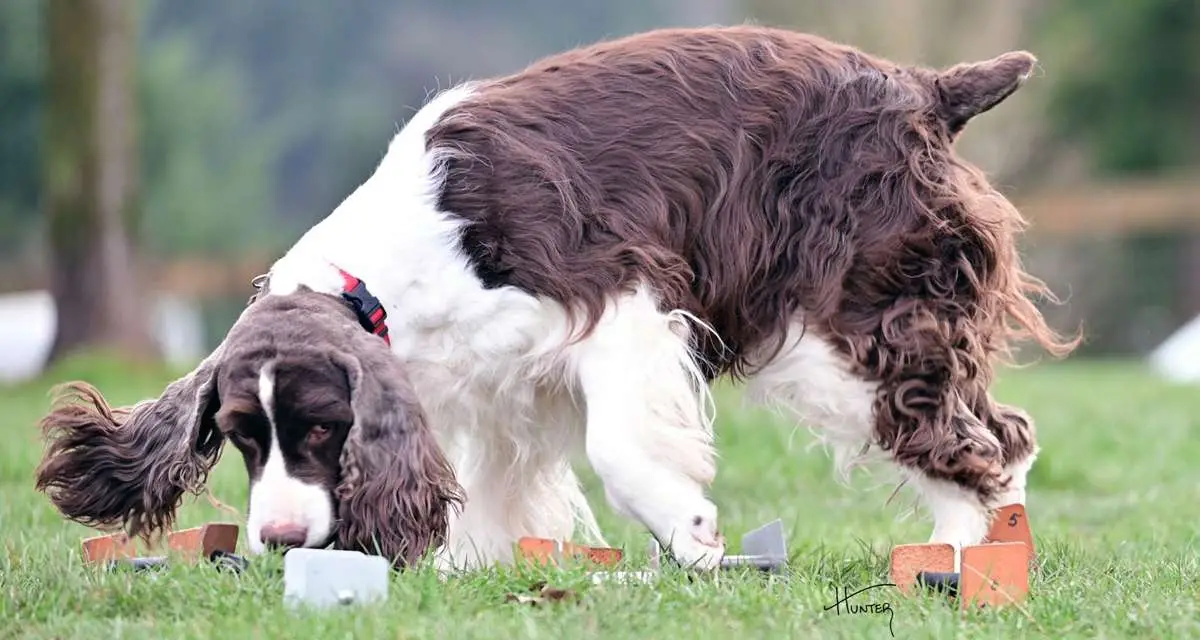
Challenges with Traditional Training Methods
Traditional methods of training may not be as effective with Springer Spaniels.
- Sensitivity to Harsh Correction: English Springer Spaniels can be sensitive to harsh corrections. While some dogs thrive on firm correction techniques, Springer Spaniels often react negatively to punishment or harsh methods. These methods can potentially intensify problems like fear or anxiety that can lead to further behavioral issues like aggression or shyness. Understanding their sensitive nature and adapting the training style accordingly is critical to achieving effective and positive results.
- Need for Consistency and Patience: Springer Spaniels may require more patience and consistency during training than some other breeds. They can be quite eager to please when met with a positive environment, but they can also be distractible. A consistent approach across all training sessions and interactions can result in smoother progress and greater success. Regular reinforcement and positive feedback are crucial for maintaining motivation. They might take a little longer to understand complex instructions or commands, but with a loving and understanding trainer, they can learn to perform complex feats.
- Short Attention Spans: Often, Springer Spaniels have shorter attention spans than certain other dog breeds. The need for keeping training sessions short, frequent, and engaging is important to make the experience enjoyable and prevent boredom setting in. Variety and fun in the training techniques are excellent means to retain their interest and maximize progress. It’s not just about the quantity of training, but also the quality and ingenuity with which it’s provided.
Positive Reinforcement Techniques
Positive reinforcement techniques are ideally suited for training English Springer Spaniels and building a positive relationship with them.
- Rewards and Praise: Positive reinforcement methods utilize treats, praise, and play as rewards for desirable behaviours. These methods promote enthusiasm and encourage them to confidently make the right choices in different scenarios. When they exhibit wanted traits, they are immediately rewarded with something they find pleasurable, solidifying the relationship between action and reward. A key insight is that it’s not about avoiding negative experiences; it’s about making it evident that certain actions are rewarded.
- Building a Strong Bond: With this method, the training process is seen as a shared experience, strengthening the bond between you and your dog. This positive approach reinforces the concept that training is enjoyable and reinforces your position as a positive and trustworthy leader in their world. The development of a close working relationship is extremely beneficial for a breed like the Springer Spaniel, where a strong bond is key to overcoming potential behavioral challenges.
- Creating Positive Associations: Utilizing positive reinforcement techniques helps create positive associations with training and build confidence within your dog. This way, training becomes a welcomed experience rather than something that evokes fear or apprehension. They are more likely to engage and stay excited towards a training session when they know it’s associated with positive experiences and rewards.
Early Socialization and Its Impact
The significance of early socialization cannot be overstated in managing English Springer Spaniel behavior problems. It sets the stage for emotional and social well-being, shaping how they interact with the world around them.
Importance of Puppy Socialization
Socialization during puppyhood is the period where introducing them to new people, animals, and environments is crucial.
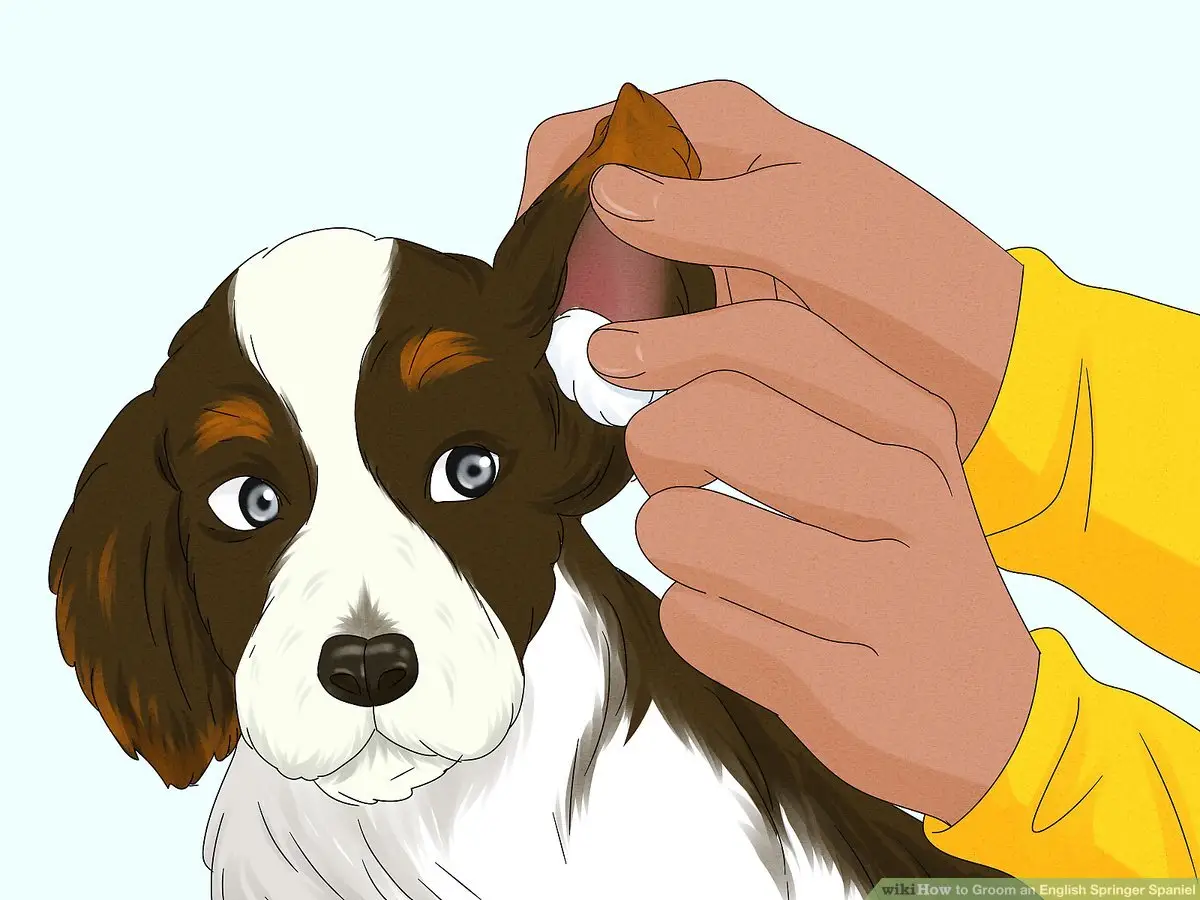
- Developing Social Skills: The most crucial role of early socialization is helping the puppy to develop essential social skills. When they are young, their brains are incredibly receptive to learning and building interactions with diverse people, dogs, and environments. By exposing them to various sounds, sights, and smells, you’re helping them develop a more confident and relaxed demeanor in different situations. They learn positive social cues from interactions with other dogs and how to engage appropriately with people in a wide range of settings.
- Building Emotional Resilience: Socialization also contributes to emotional resilience. Exposure to a variety of situations from a young age equips them with the tools to cope more easily with future experiences, such as encounters with other dogs, new people, and unfamiliar environments. The more diverse experiences they gain in their early stages, the more comfortable they become navigating diverse situations later on. Understanding that the experiences they have now impact their future interactions is crucial to their proper development.
- Reducing the Risk of Fear and Anxiety: Early socialization significantly reduces the risks associated with developing fear or anxiety as they mature. The ability to confidently navigate new or unusual situations is largely determined by their exposure to these situations in puppyhood. They learn that encountering unfamiliar stimuli doesn’t always need to lead to a negative experience; it can, in fact, simply be a new and interesting part of the world worth exploring.
Consequences of Limited Interaction
Conversely, limited exposure can significantly impact their behavior in the long run.
- Fear of Novel Stimuli: Springer Spaniels who don’t receive early socialization may develop fear and anxiety towards novel environments and experiences. They haven’t learned to cope with the world’s diversity and uncertainty, leading to a reactive response to potentially harmless stimuli. For example, the sound of a vacuum cleaner or fireworks might trigger a state of extreme anxiety or fear rather than simple curiosity or indifference. A well-socialized dog is more likely to tolerate a range of novel experiences and manage uncertainty more effectively.
- Aggression or Shyness: The lack of social interaction can lead to increased aggression or shyness. When they haven’t learned to interact with others appropriately, it can result in aggressive behaviors towards other dogs or fear-based reactions around humans. They may become easily startled and react defensively, even in scenarios where such reactions are not necessary. A key insight here is that while the intent might not be malicious, their lack of positive interactions with varying stimuli can manifest as defensive and problematic actions.
- Challenges with Adaptability: Limited interaction can contribute to difficulty adapting to change. Without early socialization, they may find it much more challenging to adjust to new environments, routines, or situations. Even a simple change like a different walking route could prompt anxieties and result in undesirable behaviors.
Identifying Specific Behavior Patterns
Certain behavioral patterns are more common in English Springer Spaniels than others. Understanding these patterns can offer clues into their underlying motivations and help us manage their behavior more effectively.

Dominance Aggression
Dominance aggression is a behavioral issue where the dog attempts to establish dominance over others.
- Signs of Dominance Aggression: Dominance aggression might manifest as growling, snapping, or even biting when they feel threatened or wish to control something, such as their toys, food, or favourite spot on the sofa. This behaviour can also manifest when you try to take something away from them or when they become agitated or protective of their space. Understanding of body language is critical when trying to assess and manage this behavior.
- Causes of Dominance Aggression: In English Springer Spaniels, dominance aggression can be influenced by several factors, including genetics, early experiences, and the lack of appropriate socialisation. In essence, the dog has not learned to effectively navigate a social hierarchy or cope with stressful situations. The inherent tendencies towards hunting and prey drives can also play a role in dominance aggression, especially if they haven’t learned appropriate social boundaries.
- Managing Dominance Aggression: Early socialization and consistent training are essential for managing this behavior, especially in puppies. However, it is a complex behavior with roots in a number of different factors, and you might need support from a professional trainer. The consistent reinforcement of appropriate responses and redirecting any aggressive behaviour with positive reinforcement techniques are crucial for modifying this behavior pattern.
Resource Guarding
Resource guarding is a behaviour where a dog becomes protective or possessive over resources such as food, toys, or even spaces.
- Signs of Resource Guarding: Dogs that practice resource guarding can exhibit several behaviors like growling, snarling, snapping, or even biting when someone gets too close to their valued items. It’s a defensive response aimed at securing the desired resource. The key here is to recognize the signs of tension and protective behavior before they escalate to more aggressive actions. Body language is a useful tool in identifying early signs of resource guarding.
- Causes of Resource Guarding: The causes of resource guarding can vary. It can be an instinctive behavior that stems from their genetic predisposition, especially if they are used to being in resource-scarce environments. Lack of early exposure to sharing and potentially fearful or traumatic past experiences can also contribute to it. A dog’s guarding of resources may also be related to social anxiety or insecurity if they feel the need to protect those items to compensate for these feelings.
- Managing Resource Guarding: Managing resource guarding requires a multi-faceted approach. Teaching the dog that sharing can be a positive experience is important, and ensuring they don’t feel threatened by someone getting close to their things is key here. Start by introducing a range of positive experiences around their food or toys, associating it with calm and positivity. It’s ideal to work with a professional trainer when addressing this behavior as it can be challenging to manage without correct guidance.
Providing Physical and Mental Stimulation
Providing a balanced blend of physical and mental stimulation is key to managing English Springer Spaniel behavior problems. We’ve already discussed it, but let’s explore it further.

Importance of Regular Exercise
Regular exercise is a cornerstone of managing the behavior of this breed.
- Burning Excess Energy: Their naturally high energy levels need plentiful opportunities for exercise. When they are physically active, they are less inclined to exhibit undesirable behaviours like excessive barking or destructive chewing. Daily walks, playtime, and interactive games go a long way in alleviating pent-up energy and contributing to their emotional well-being.
- Promoting Physical Health: Exercise is fundamental to their overall health. It keeps their muscles toned, boosts their cardiovascular health, and contributes to a healthy weight. This ensures they are physically capable of actively engaging in various activities and living a healthy life.
- Impact on Mental Health: Regular exercise not only helps them burn energy but also provides mental stimulation and has a positive impact on their mental health. Physical activity is closely linked to psychological wellbeing for dogs, similar to humans. Exercise contributes to their overall calmness and reduces anxiety or stress, leading to an overall improved temperament and behaviour.
Engaging Activities for Mental Health
Engaging in mental activities is as essential as physical exercise.
- Training and Obedience: Training helps to develop a working relationship and allows you to shape their behaviour. It creates mental engagement, boosting their brainpower and reinforcing positive behaviours. Even simple games like ‘fetch’ or ‘hide and seek’ engage their minds and provide them with a sense of accomplishment when successful. Training stimulates their minds and helps develop a strong bond between you and your dog.
- Puzzle Toys and Interactive Games: These can give them hours of mental stimulation. Puzzle feed toys encourage them to use their senses to retrieve treats or food, which is often highly engaging for them. These offer them challenges and foster problem-solving skills, keeping them busy and mentally sharp. Mental stimulation combats boredom and reduces the likelihood of them resorting to undesirable behaviours to entertain themselves.
- Scent Work: Their keen noses make scent work an incredible form of mental enrichment. Activities like tracking or hide-and-seek using scents provide immense satisfaction and stimulate their minds. Many dogs find scent work deeply fulfilling and engaging, a fact that can be effectively leveraged for training and behavioural modification.
Creative Solutions for Behavioral Issues
In addition to the essential elements of training and exercise, some creative solutions can be particularly beneficial in managing certain behavior patterns.
Agility Training
Agility training is a fun and engaging activity for many dogs, particularly those with high energy levels like Springer Spaniels.

- Physical and Mental Stimulation: Agility training not only provides a significant amount of physical exercise but also serves as a compelling form of mental stimulation. It requires them to focus, listen to instructions, and navigate a challenging environment. The combined physical and mental engagement is crucial to burning off their energy and also builds their confidence and agility.
- Building Confidence and Focus: The training sessions build a sense of confidence in them as they successfully navigate through different obstacles. They learn to focus on the task given and rely on their owner for guidance. Agility training can significantly improve their self-esteem and ability to focus on specific instructions, promoting positive behaviors.
- Building a Stronger Bond: Sharing this activity with you can build a strong bond between you and your dog. It’s a collaborative effort that requires trust and communication. The shared experience and their successes within the training process strengthen their bond immensely. They learn to rely on you for leadership and guidance, which translates to a greater willingness to follow your instructions and respond positively to training in other aspects of their lives.
Problem-Solving Exercises
Engaging them in problem-solving exercises can be a great way to stimulate their minds and channel their energy.
- Toy Hiding and Retrieval: Hiding toys and treats around the house can provide a fascinating game for them. They love using their incredible sense of smell to locate those hidden treasures. The challenge of finding their prize engages their cognitive abilities and provides a powerful mental workout. These games teach them to channel their inherent curiosity into something productive and fulfilling rather than creating mischief or destroying belongings.
- Interactive Puzzle Feeders: Interactive puzzle feeders provide a fun way to deliver their meals in a way that challenges their mental abilities. They need to work for their food, fostering problem-solving skills and keeping them engaged for a longer period. This is particularly beneficial if they tend to gulp their food too quickly. Interactive feeders can provide a slow and controlled way for them to eat while stimulating their minds.
- Training Courses and Activities: Consider activities like scent work, where you can teach them to follow trails and find hidden objects. These are very engaging and can channel their natural instincts into something positive and fulfilling. These courses or activities provide them with the opportunity to use their incredible sniffing abilities and offer a sense of accomplishment that helps shape their behavior outside of these structured environments.
Understanding Stress Indicators
Recognizing signs of stress and anxiety in your English Springer Spaniel is crucial for addressing potential behavioral problems proactively.
Signs of Discomfort or Anxiety
It’s crucial to be aware of the common signs exhibited by dogs when experiencing stress or anxiety.
- Body Language: Observing their body language can provide many clues into their emotional state. Signs like lowered ears, a tucked tail, lip-licking, yawning, or whale-eye (showing the whites of their eyes) are usually indicators of discomfort or anxiety. If they are stressed or anxious, they might also have a tense or rigid posture. It’s important to learn the subtleties of canine body language and to learn to distinguish between a more positive state of alertness and anxiousness in their body postures.
- Behavioral Changes: Behavioral changes like excessive barking, pacing, destructive behaviours like scratching or chewing, or changes in their eating or sleeping patterns can also indicate emotional distress. They may also be less playful, more withdrawn, or seem to hide more. These signs can sometimes indicate a more significant emotional change that needs to be addressed. Recognizing these changes promptly can contribute to intervention before the issue worsens.
- Changes in Urine and Faeces: In extreme cases, changes in their elimination routines might also be an indicator of stress or anxiety. If they begin to urinate or defecate in the house when they haven’t exhibited this behaviour before, they might be experiencing an intense emotional response to a specific situation or environmental change. This could also be indicative of a more severe anxiety issue that needs to be assessed carefully.
Addressing Obsessive Behaviors
Obsessive behaviors are a common sign of stress or discomfort in some dogs.
- Excessive Licking or Chewing: Springer Spaniels, due to their high energy levels and sensitive nature, are prone to obsessive behaviours in certain circumstances. Excessive licking or chewing, beyond their natural tendencies, can be a sign of underlying anxiety or distress. They might be licking constantly or incessantly chewing on their paws or themselves. This can lead to skin issues or infections in the long run. Addressing the underlying cause is essential to stop the obsessive behaviour.
- Understanding the Cause: It’s crucial to understand the trigger for obsessive behaviours. In some cases, it can be a response to a medical condition or discomfort that needs to be evaluated by a veterinarian. But in other instances, it can stem from environmental changes, anxiety, or boredom. A detailed assessment of their behaviour can help pinpoint the real reason behind this behaviour. It’s important to understand that it’s likely a coping mechanism triggered by negative emotions.
- Seeking Professional Advice: In cases where you are unable to address the issue yourself, it’s crucial to seek veterinary or professional behavioral advice. They can help you establish a diagnosis and the appropriate intervention strategy. Professional intervention can involve medication, behavioural modification techniques, or a combination of both.
The Consequences of Neglecting Behavioral Needs
Ignoring behavioral issues can have serious repercussions, impacting the dog’s quality of life and potentially leading to more severe problems.
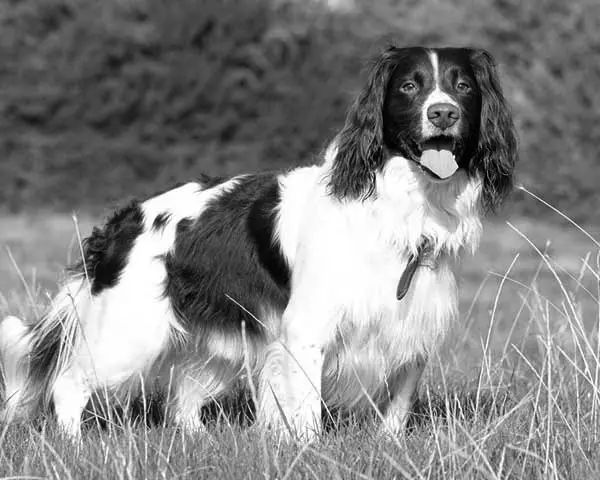
Risks Associated with Unaddressed Aggression
If aggression or dominance behaviors aren’t addressed, they can escalate into dangerous situations.
- Safety Risks: Springer Spaniels that haven’t been trained or socialized appropriately may present a danger to others if their aggression or dominance behaviors are not properly managed. This can be incredibly concerning around children or other individuals who might not recognize canine signals effectively or might not be able to anticipate the dog’s reaction.
- Risk to Family and Others: An aggressive dog can pose a serious safety hazard for family members, particularly children, if they are not properly managed and trained. While Springer Spaniels are typically very affectionate with their families, dominance issues can lead to unexpected aggressive responses that can injure individuals if left unaddressed.
- Legal Responsibilities: Aggression toward other people or animals can also result in legal challenges for owners. In certain cases, depending on the severity of the aggression, it might lead to legal action due to the potential risks to public safety. Recognizing the potential implications before the situation escalates is crucial for the safety of both your pet and those around them.
Community Considerations in Pet Ownership
Responsible dog ownership extends beyond individual dogs and their families.
- Integrating Pets into Society: Well-trained and well-socialized dogs can seamlessly integrate into their communities. This positively impacts the relationship between dogs and humans in neighbourhoods, parks, or social settings. Springer Spaniels that are properly trained and are comfortable in various social settings can positively influence the overall atmosphere of a community.
- Promoting a Harmonious Coexistence: Understanding Springer Spaniel behavioural patterns and adopting responsible training methods can contribute significantly to a harmonious and peaceful co-existence between dogs and the community. Responsible training fosters a more positive perception of dogs and enhances the overall human-animal bond within a community. The dog becomes a welcome addition to the neighborhood rather than an object of concern or anxiety.
- Raising Awareness about Canine Behavior: Owners can play a crucial role in educating others about canine behaviour. By sharing their knowledge and experience, particularly if they encounter specific or challenging behaviours with their Springers, they can create a safer and more respectful living environment for both dogs and people. Educating the public through their personal experiences can lead to greater understanding and tolerance for dogs in the community as a whole.
Building a Strong Bond through Training
Training is not only about managing unwanted behavior but also about nurturing a stronger and more fulfilling bond.
Importance of Consistency
Consistency is a crucial element in building a positive and strong relationship with your Springer Spaniel.
- Reliable Interactions: Consistency in training reinforces behaviours and helps them understand what is anticipated of them. This reliability in your approach makes them feel more secure and certain about what’s expected of them, building trust and confidence. They learn to anticipate and trust your responses, which enhances communication and understanding. A consistent approach also makes it easier for them to learn and remember, making the training process more efficient and enjoyable for both of you and them.
- Predictability and Security: Consistency in your actions builds a sense of structure and predictability within the dog’s world. This predictability creates a sense of security for them, particularly for a sensitive breed like the Springer Spaniel. They feel safer and more comfortable when they can understand what to expect from your interactions with them. A predictable environment reduces anxiety and enhances trust within your relationship, resulting in a more secure and well-behaved dog.
- Reducing Confusion: A consistent training style and approach reduce confusion and stress. It allows them to have clear expectations and avoids conflicting messages that can lead to anxiety or frustration. They are less likely to experience fear or apprehension relating to the training process.
Benefits of Mutual Respect
A strong bond built on mutual respect is at the core of a successful relationship with your English Springer Spaniel.

- Clear Communication: Mutual respect fosters a healthy channel for communication between you and your dog. They understand that their needs are considered and valued, and they are more likely to respect your boundaries and instructions. This results in a clear and effective communication flow, where they learn to understand your body language and your tone of voice better.
- Enhanced Obedience and Cooperation: When built on mutual respect, obedience and cooperation are more likely to occur. They understand that your leadership is grounded in care and that the training environment is safe and positive. They are more willing to comply with requests and follow instructions, understanding that you are not trying to dominate but rather collaborate with them towards a positive outcome.
- Positive Relationship: Mutual respect is the core of a positive and healthy relationship. They learn that you are a trustworthy and loving leader in their world, reinforcing their trust and creating a stronger foundation for a harmonious bond. This mutual respect strengthens the bond and creates an atmosphere of trust and understanding.
Tailored Approaches for English Springer Spaniels
Every English Springer Spaniel is an individual with their own unique personality and temperament. Recognizing these differences is crucial for adapting your training techniques and providing appropriate care.
Recognizing Individual Differences
Breed characteristics provide a general blueprint, but each dog is unique.
- Personality Traits: Some Springer Spaniels might be more energetic and boisterous, while others may be more laid-back and less enthusiastic. Recognizing their individual personalities and taking them into account during training sessions is vital. Some dogs may be more prone to fear or anxiety than others, or some might readily engage with training, while others might require a more gradual and gentle introduction.
- Temperament and Sensitivities: Certain individuals can be more sensitive to noise or new environments than others. Being aware of those specific sensitivities is essential during training. When training, be sensitive to their individual personalities and needs. Never assume that one technique that works for one dog will work for every Springer Spaniel in the world. Every dog is a nuanced individual.
- Learning Styles and Pace: Each Springer Spaniel exhibits different learning styles and progresses at their own pace. Some dogs can grasp new concepts and commands more quickly than others, demanding a change in training tactics and reinforcement strategies as they learn and evolve. Some may prefer interactive games, while others might respond better to praise or rewards.
Adjusting Techniques Based on Temperament
With a better understanding of each dog’s unique needs, you can adapt your training techniques and approaches.
- Tailoring Training Methods: The training approach used should
Adjusting Techniques Based on Temperament
With a better understanding of each dog’s unique needs, you can adapt your training techniques and approaches.
- Tailoring Training Methods: The training approach used should be tailored to meet the specific temperament of your English Springer Spaniel. For instance, if your dog tends to be shy or fearful, incorporating gentle and positive reinforcement methods is crucial. This could involve gradually exposing them to new situations and rewarding their bravery with treats or praise. On the other hand, if your dog exhibits high-energy behaviors, incorporating physical activities like fetch or agility exercises can help channel that energy into productive outlets.
- Utilizing Different Reinforcement Strategies: Dogs, just like humans, have different motivators. Some may respond exceptionally well to food rewards, while others find praise or playtime to be more enticing. Identifying what drives your individual Springer Spaniel allows for a more engaging training experience. If your dog is particularly sensitive, it might be best to use softer, more encouraging tones during training to avoid overwhelming them. Conversely, a more exuberant dog may thrive on an energetic trainer who matches their enthusiasm.
- Monitoring Progress and Readjusting: Regularly evaluating how your Springer Spaniel responds to training is essential. If certain techniques seem ineffective or even counterproductive, don’t hesitate to modify your approach. This ongoing assessment not only helps in meeting your dog’s needs but also demonstrates a willingness to learn and grow as a dog owner. For instance, if one method leads to frustration, switching gears to incorporate more interactive exercises or fun games might re-engage them and foster a stronger learning environment.
Long-term Commitment to Behavioral Health
Ensuring the behavioral health of your English Springer Spaniel requires a long-term commitment from their owner. This isn’t merely about addressing issues as they arise but also focusing on sustained growth and development throughout their life stages.
Ongoing Training and Socialization
Continued training and socialization play pivotal roles in maintaining a well-adjusted Springer Spaniel.
- Lifelong Learning: Just as humans continue to learn and evolve, dogs benefit immensely from ongoing training. Engaging in regular training sessions helps reinforce previously learned commands while introducing new challenges. Keeping their minds active prevents boredom and reduces the risk of undesirable behavior stemming from inactivity. Activities such as obedience classes, trick training, or even rally competitions can keep both you and your dog engaged and excited about learning together.
- Socialization Opportunities: Providing continued socialization experiences is vital for preventing behavioral problems down the road. Regular interactions with diverse groups of people, environments, and animals will help your Springer Spaniel become a well-rounded and adaptable companion. Seek out opportunities for supervised playdates with other dogs and consider enrolling in group classes. Making these encounters positive and enriching enhances their confidence and reduces anxiety around new experiences.
- Adapting to Life Changes: Life circumstances change, and so do a dog’s socialization and training needs. Whether moving to a new home, welcoming a new family member, or experiencing changes in routine, it’s important to reassess and adjust your approach to accommodate these transitions. Ensuring your dog continues to feel secure and confident during periods of change supports their overall mental and emotional well-being.
Continuous Engagement and Activities
Providing continuous engagement and varied activities keeps your dog physically stimulated and mentally sharp.
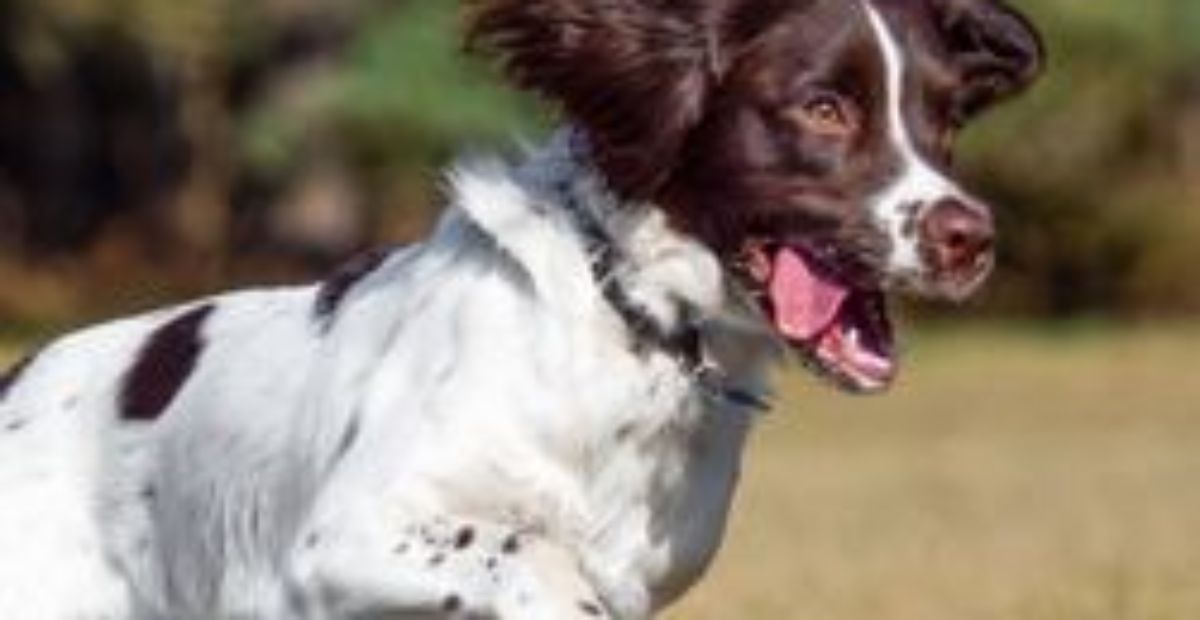
- Variety of Activities: Incorporating a wide range of activities ensures your Springer Spaniel remains engaged and enthusiastic. Beyond basic walks, consider activities like hiking, swimming, or even dog sports like flyball or scent work. Engaging in these pursuits not only fulfills their exercise requirements but also strengthens the bond shared between you and your dog. It’s essential to find a balance between structured activities and open-ended playtime, allowing for variability in their daily routine.
- Mental Challenges: Mental stimulation is just as crucial as physical activity. Implementing puzzle toys, obedience tasks, or interactive games encourages critical thinking and problem-solving skills. These mental challenges can help alleviate potential boredom-related issues like chewing or barking. Simple tricks or scent-based games can also engage your dog cognitively, making training sessions feel less like chores and more like fun bonding experiences.
- Routine but Flexible: While creating a regular routine is important for providing structure, it’s equally essential to allow space for flexibility. A rigid schedule may lead to feelings of monotony, which can negatively impact your dog’s enthusiasm for interaction. Striking a balance between routine activities and spontaneous adventures keeps the excitement alive, fostering a flourishing and dynamic relationship.
Resources for Owners
As an English Springer Spaniel owner, having the right resources at your disposal is crucial for navigating any behavioral concerns or training challenges.
Finding Professional Help
Knowing when to seek assistance from professionals can save time and stress for both you and your dog.
- Professional Trainers: If you find yourself struggling to manage behavioral issues or are unsure how to proceed with training, enlisting the help of a professional trainer can be invaluable. Look for trainers who specialize in positive reinforcement techniques and have experience working with Springer Spaniels. They can provide personalized guidance based on your dog’s specific needs and help you develop effective strategies to address challenges.
- Behavioral Specialists: In some cases, behavioral issues may require the assistance of a certified animal behaviorist. These specialists can assess deeper-rooted problems and provide insight into potential underlying causes. Their expertise can be particularly beneficial if your dog displays aggression or extreme anxiety, ensuring you receive appropriate support and actionable steps for improvement.
- Veterinary Guidance: Always consult with your veterinarian if you suspect medical issues may be contributing to behavioral problems. Physical discomfort, illness, or neurological issues can manifest as behavior changes, and addressing any underlying health concerns must be a priority in the training process.
Recommended Literature and Organizations
Staying informed about dog behavior can empower owners to make educated decisions.
- Literature: Numerous books and online resources delve into understanding canine behavior and effective training methods. Titles by renowned trainers or behaviorists can provide valuable insights while offering practical tips tailored for English Springer Spaniels. The knowledge gained from these resources can bolster your training efforts and enhance your relationship with your dog.
- Organizations: Joining organizations dedicated to dog education, training, and welfare can further enrich your understanding. Many breed-specific clubs offer training resources, workshops, and opportunities to engage with other Springer Spaniel enthusiasts. Connecting with a community of like-minded individuals fosters a sense of belonging and support while sharing experiences and insights.

Conclusion
Understanding English Springer Spaniel behavior problems involves recognizing the nuances of the breed and approaching training with adaptability and compassion. By embracing their unique temperament, committing to lifelong learning, and engaging in meaningful activities, owners can cultivate a harmonious bond with their Springers. Through consistency, mutual respect, and tailored approaches, we can ensure our beloved dogs thrive, resulting in fulfilled, happy companions within our communities.

